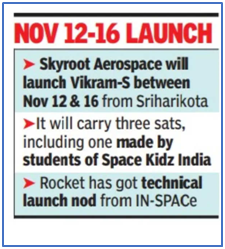India’s first private launch vehicle all set for maiden flight
26-08-2023
12:21 PM
1 min read

What’s in today’s article:
- Background (About India’s Space Sector)
- About IN-SPACe (Objectives, Functions, HQ, etc.)
- News Summary (Launch of Vikram-S, Mission Prarambh)
Why in news?
- India’s first privately developed launch vehicle –Vikram-S – is all set to make its maiden flight from the country’s only spaceport in Sriharikota between November 12 and 16.
Background:
- Led by Indian Space Research Organisation (ISRO), India’s space program has impressively evolved for the past 50 years.
- In terms of technological capabilities India ranks among the top 5 space faring nations of the world.
- India is globally recognised for building low-cost satellites and launch vehicles.
- Despite having world’s most accomplished space program, India’s space sector accounts for only2-3% of the global space economy.
- The global space economy is estimated at ~US $440 billion.
- To increase the share in the global business, Government of India has initiated the space sector reforms, to promote, handhold, regulate and authorise private enterprises and start-ups to undertake space activities.

Indian National Space Promotion and Authorization Center (IN-SPACe):
- IN-SPACe is an independent nodal agency under Department of Space (DoS).
- It was set-up for allowing space activities and usage of DoS owned facilities by non-governmental private entities as well as to prioritize the launch manifest.
- As a part of space sector reforms in June 2020, the Government of India had set up the IN-SPACe.
- Objective – To ensure greater private participation in India’s space activities.
- IN-SPACe will act as an interface between ISRO and private parties, and assess how best to utilise India’s space resources and increase space-based activities.
- It will assess the needs and demands of private players, including educational and research institutions, and, explore ways to accommodate these requirements in consultation with ISRO.
- Headquarters of IN-SPACe is located in Ahmedabad, Gujarat.
- IN-SPACe is the second space organisation created by the Government in the last two years.
- In 2019 Union Budget, the Central Government had announced the setting up of a New Space India Limited (NSIL).
- NSIL is a Public Sector Undertaking (PSU) set up to serve as a marketing arm of ISRO.
Foreign Direct Investment (FDI) Approval in Space Sector:
- Presently, FDI in space is allowed under government route only for satellite establishment and operations.
- FDI in space is approved by the Government on a case-by-case basis and often this approval takes time.
- However, witnessing the change in approach of the Indian Government towards private players involvement, Indian companies will be allowed to invest up to 100% and 70% through FDI with approval of centre in all the streams Upstream, mid-stream and downstream segment.
Present Scenario:
- IN-SPACe has so far received 67 proposals in the areas of launch vehicles, satellites, space applications, ground systems and research from entities from small to big entities.
- Moreover, 10 memorandums of understanding (MoUs) have been signed between private players and IN-SPACe, including eight in payload and two in vehicle launches.
News Summary:
- Hyderabad-based space technology startup Skyroot Aerospace is set to make history by sending India’s first privately-developed rocket – Vikram-S – into space.
- Marking the beginning of private sector launches, the mission named ‘Prarambh’ will see Vikram-S rocket carry three customer satellites in a sub-orbital flight.
About Mission Prarambh:
- The Vikram-S rocket is a single-stage sub-orbital launch vehicle.
- Sub-orbital flight are those vehicles which are travelling slower than the orbital velocity – meaning it is fast enough to reach outer space but not fast enough to stay in an orbit around the Earth.
- Under mission Prarambh, Vikram-S will carry three customer satellites in a sub-orbital flight.
- With this mission, Skyroot Aerospace is set to become the first private space company in India to launch a rocket into space.
- Skyroot's launch vehicles are named 'Vikram' as a tribute to the founder of the Indian space programme and renowned scientist Vikram Sarabhai.

